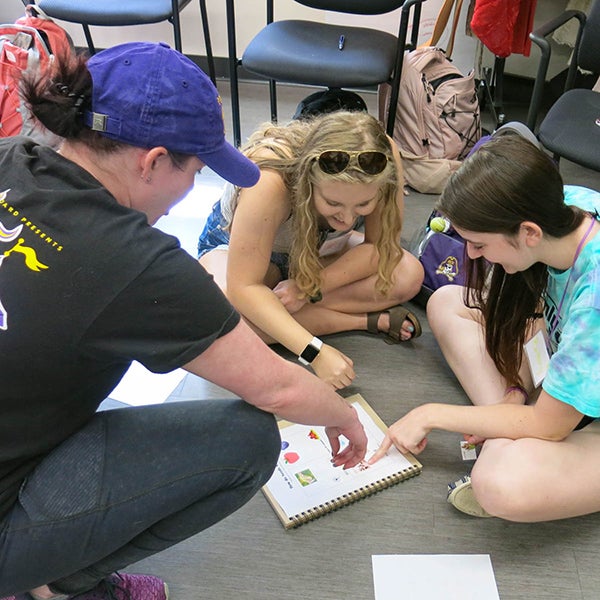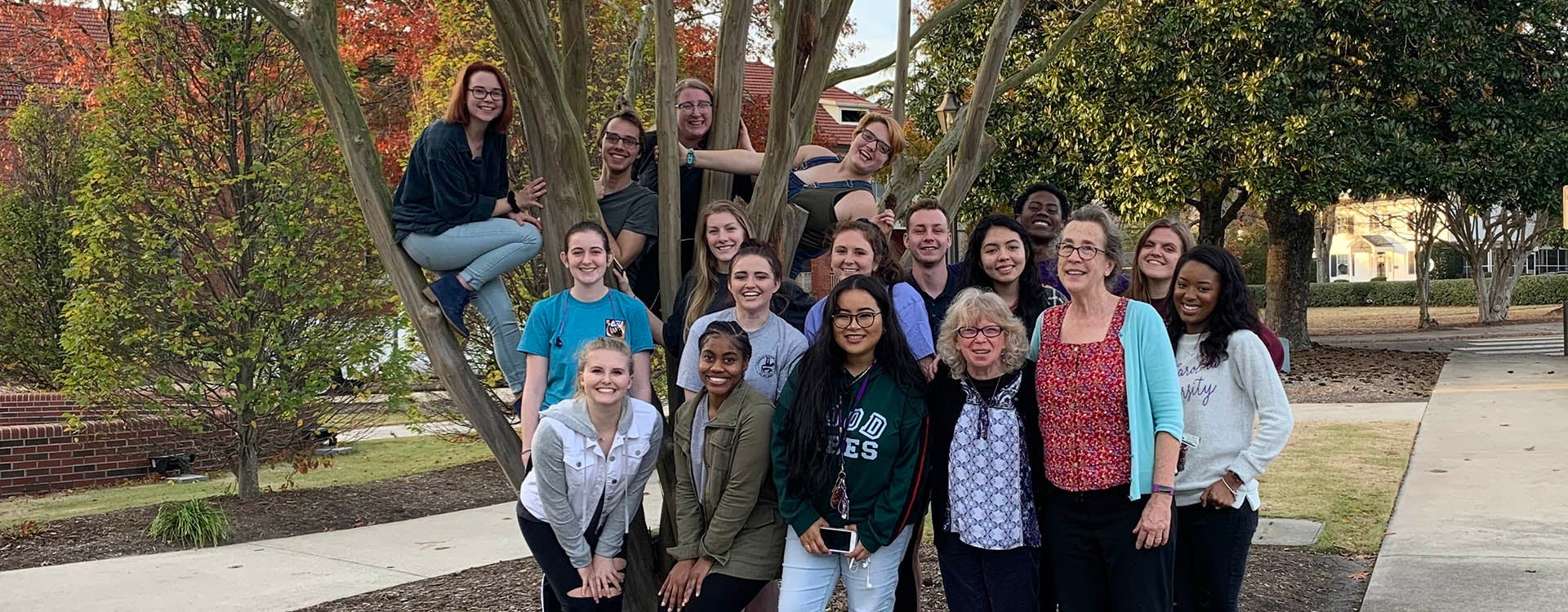NEW SCRIPT
Theatre and biology students adapt original play for virtual audience
As the spring semester ended, a yearlong project by theatre and biology students at East Carolina University resulted in a reimagined product.
The students wrote and performed “Molly and Her Tree Life Adventures,” a play about a girl named Molly and an apple tree at her elementary school. Molly and her classmates rally to save the tree from a planned parking lot while learning more about the connection between plants and people.
Originally written for a live audience, a virtual production was created after classes went online because of the coronavirus pandemic. Actors recorded the script as well as monologues as characters in the play, and biology students created classroom activities about photosynthesis, plant and apple life cycles, and seed dispersal. The package — recently shared with Pitt County Schools — also included scene and costume designs prepared for the play.
Zachary Stone of Garner, who graduated May 8 with a fine arts degree in theatre arts with a concentration in theatre for youth, said he was drawn to the project that created an integrated art and biology curriculum for area schoolchildren. “I also knew that I was going to expose myself to an environment where I would be able to learn and gain a new perspective while creating art,” he said. “While having two different groups of students that speak two different academic languages, by collaborating we have created our own that proves to be universal.”
Victoria Workman of Graham was one of three biologists dedicated to bridging science and art through the project. “Science is not just graphs and textbooks. It is the careful, artistic weaving of chemical reactions and molecules and natural law into the world we see around us,” she said. “It is the tangible expression of what is seemingly impossible. Art and science belong together. And that is what is at the core of this project.”
Workman, who recently graduated with a bachelor’s degree in biology with a concentration in molecular and cellular biology, said she hopes that “children and teachers will be able to get a sense of how beautifully complex and intuitive nature really is. I would love to think that the performance could inspire a future generation who respects the world around us and pursues a future focused on research and conservation.”
Stone, who portrayed Sam the squirrel, said he hopes the project encourages children to write their own stories.
Connor Gerney of Raleigh, who designed the set and acted as the apple tree, said he got involved because he likes using art to teach other subjects. “Presenting complicated topics to young people in fun and interesting ways can be life-changing, and I wanted to be a part of that,” he said.

Connor Gerney, who graduated May 8, designed the set for the play.
Biology and art students met during the fall semester in combined classes as they wrote the script and designed the set and costumes. Rehearsals had begun for the touring production before spring break and the move to off-campus instruction.
“As soon as we are able, we would love to tour the play live as originally planned,” said Patch Clark, ECU theatre arts professor. “We hope that teachers will be able to use the resources in their classrooms, and the community may benefit as well.”
Clark and Carol Goodwillie, ECU biology professor, collaborated on the grant-funded biotheatrics project after finding common ground in different disciplines. They had heard each other speak about their teaching projects as past recipients of the UNC Board of Governors’ Awards for Excellence in Teaching.
“Patch had done some great outdoor youth theatre about nature,” Goodwillie said. “I had done some teaching in biology that involved community service, and I had grown up with children’s theatre as my mom directed children’s plays and taught creative dramatics. We were eager to find a way to collaborate and settled on this project.”
Moving the project online was a challenge but didn’t stop the students, said Gerney, who recently earned fine arts degrees with concentrations in professional actor training and theatre for youth.
“We ended up recording a read-through of the script on Zoom, and each actor also was asked to write and record a monologue from their character’s perspective,” he said. “So I worked with one of the biology students because I wanted to accurately teach photosynthesis in my monologue. Then I drew pictures to go along with it and edited it all together into a short, four-minute educational video taught by the tree from our play.”
Bouncing ideas digitally instead of in person was difficult to replicate, but the group became more creative, Workman said. “It was amazing to watch people rise to the occasion,” she said. “As a biologist, I am typically in the lab doing research or have my nose in a textbook. It was a refreshing change to be given the freedom to imagine and create alongside ECU theatre students.”

Students review notes and ideas for the play in the School of Theatre and Dance before classes moved online after spring break.
ECU students had been scheduled to present the play at two area schools, an Arbor Day event, the ECU Earth Day Expo and other venues to reach a range of audiences. The project was incorporated through ECU’s global classroom with students at Krosno State College in Krosno, Poland. Dr. Dominik Wrobel provided content about plant life, trees and related information about Poland to ECU students. The biotheatrics project also will be shared with partners at the University of Shimane, Japan, Clark said.
“We hope to make at least some of that happen next year. We also hope to share our experiences with both biologists and youth theatre professionals through journal articles in the next year,” Goodwillie said.
One of the schools scheduled for a performance was Wahl-Coates Elementary School of the Arts in Greenville, which has 435 students in kindergarten through fifth grade. Theater teacher Dylan Ritch said he used the virtual project to develop three separate lessons in monologue writing, set design and observation in scientific research.
“Many of my students said they enjoyed the material,” said Ritch, adding that ECU’s forward-thinking project inspired him and his students.
“Arts strengthen our emotional resolve and improve our communication skills. Nothing could be more important in times of isolation,” he said. “The arts work in a perfect duality by rejuvenating the mind as well as furthering a child’s academic process.”

Biology and art students in the biotheatrics class taught by ECU professors Patch Clark and Carol Goodwillie stand outside during the fall semester.
